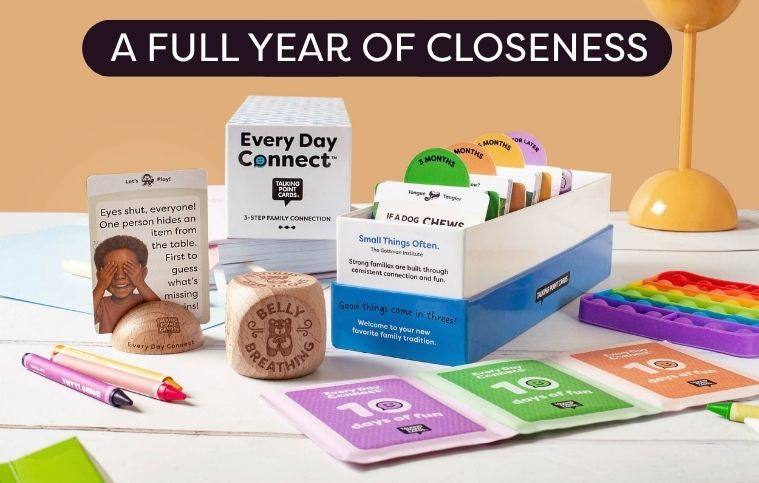SHOP
About
Become a Chat Champion
How to Make a Conversation Memorable for Everyone

Have you ever left a social gathering feeling energized and inspired, replaying snippets of amazing conversations in your head? Or walked away from an interaction wishing you could forget the whole awkward experience? The difference often comes down to conversation skills. Whether you're networking at a work event, catching up with old friends, or trying to impress a date, knowing how to get talking and keep the conversation flowing can make or break your social interactions.
But fear not - with a little know-how and practice, anyone can level up their communication game and become a true chat champion. In this guide, we'll explore strategies to make your conversations more engaging, meaningful, and memorable for everyone involved. Get ready to transform from a wallflower to the life of the party!
Why Communication Skills Matter
Before we dive into the nitty-gritty techniques, let's talk about why this stuff is important in the first place. Communication isn't just about exchanging information - it's how we connect with other humans on a deeper level. Good conversationalists tend to be more likable, influential, and successful in both their personal and professional lives.
Plus, in an age of smartphones and social media, the ability to have a real face-to-face conversation is becoming something of a lost art. Polishing your in-person communication skills can help you stand out from the crowd and form more authentic relationships.
So whether you're an introvert looking to expand your social circle or an extrovert aiming to have more substantive chats, investing in your conversation abilities is totally worth it. Trust me, future you will thank present you for putting in the effort.
The Foundations of Great Conversations
Alright, now let's get into the good stuff - how to actually become a conversation rockstar.
We'll start with some foundational principles before getting into more advanced techniques.

Be Genuinely Curious About Others
This is the #1 secret to being an amazing conversationalist. People can tell when you're faking interest, so you need to cultivate real curiosity about the person you're talking to. Approach each interaction with an open, inquisitive mindset. What can you learn from this person? What makes them unique and interesting?
Even if you think you have nothing in common at first glance, there's always something fascinating to uncover if you dig deep enough. Maybe they have an unusual hobby, an intriguing career path, or a perspective on life you've never considered before. Your job is to find that spark of interest and explore it.
Listen Actively
We all know that one person who dominates every conversation, barely letting others get a word in edgewise. Don't be that person! Good communication is a two-way street.
Practice active listening by giving the speaker your full attention. Make eye contact, nod and use other non-verbal cues to show you're engaged. Resist the urge to interrupt or immediately jump in with your own anecdotes. Instead, take the time to really absorb what they're saying.
Pro tip: Repeat back key points or ask follow-up questions to show you were paying attention. People love feeling heard and understood.
Ask Thoughtful Questions
Questions are the fuel that keeps a conversation going. But not all questions are created equal. "Yes or no" questions tend to lead to dead ends, while open-ended questions encourage the other person to open up and share more.

Some examples of great conversation-sparking questions:
-
"What's the story behind that?"
-
"How did you get interested in [topic]?"
-
"What's your take on [current event/issue]?"
-
"If you could travel anywhere right now, where and why?"
The key is to ask questions that can't be answered with a simple one-word response. Give the other person room to elaborate and tell stories.
Find Common Ground
Humans are tribal creatures - we naturally gravitate towards people we perceive as similar to ourselves. That's why finding common ground is such a powerful way to build rapport and keep a conversation flowing.
Listen for shared interests, experiences, or values as you chat. When you spot a connection, don't be afraid to highlight it: "No way, you're into rock climbing too? What's your favorite spot to climb?"
This doesn't mean you have to agree on everything. In fact, respectful debates about areas where you differ can lead to some of the most stimulating conversations. The goal is simply to establish some basis for connection and mutual understanding.
Advanced Conversation Techniques
Now that we've covered the basics, let's explore some next-level strategies to take your chat game from good to unforgettable.

Master the Art of Storytelling
Humans are hardwired to love stories. A well-told anecdote can captivate your audience and make your points more memorable than any dry recitation of facts.
The key elements of a good story:
-
A clear beginning, middle, and end
-
Sensory details that bring the scene to life
-
A dash of humor or drama to keep things interesting
-
A point or takeaway that ties into the broader conversation
Practice telling your go-to stories to friends or in front of a mirror. Pay attention to pacing, vocal inflection, and body language to really sell the narrative.
Use the "Yes, and..." Technique
This is a classic improv comedy technique that can work wonders in everyday conversation. The idea is to build on what the other person has said rather than shutting it down or changing the subject.

For example:
Them: "I've been really into baking sourdough bread lately."
You: "Yes, and I bet that makes your house smell amazing! Have you experimented with any unique flavors or add-ins?"
This approach validates their contribution while moving the conversation forward in an organic way.
Harness the Power of Vulnerability
Opening up about your own experiences and feelings can encourage others to do the same, leading to deeper and more meaningful exchanges. This doesn't mean oversharing or trauma dumping on someone you just met. But showing a bit of vulnerability by admitting to struggles or insecurities can help create a sense of trust and intimacy.
Just be sure to read the room and match the level of openness that feels appropriate for the situation.
Embrace Silence
Many people feel uncomfortable with pauses in conversation and rush to fill any silence. But learning to be okay with brief moments of quiet can actually enhance your interactions.
A well-placed pause can:
-
Give the other person time to reflect and formulate their thoughts
-
Create suspense or emphasize an important point
-
Signal that you're shifting to a new topic
Don't fear the silence - use it as a tool in your conversational toolkit.
Navigating Tricky Conversation Scenarios
Even chat champions sometimes find themselves in awkward or challenging situations. Here are some tips for handling common conversational pitfalls:

Gracefully Exiting a Conversation
We've all been trapped in a conversation that's gone on way too long. To make a smooth exit:
-
Wait for a natural pause or transition point
-
Summarize something positive about the interaction: "It's been great hearing about your stamp collection!"
-
Provide a reason for leaving: "I should go say hi to the host/get back to work/etc."
-
If appropriate, suggest future contact: "Let's grab coffee sometime and continue this chat!"
Dealing with Awkward Silences
If you find yourself stuck in an uncomfortable lull:
-
Comment on your shared environment or situation
-
Ask an open-ended question about a topic you were previously discussing
-
Share a relevant anecdote or observation
-
When all else fails, don't be afraid to acknowledge the awkwardness with humor: "Well, this got quiet! Shall we discuss the weather?"
Handling Disagreements
Difference of opinion doesn't have to derail a conversation. To keep things civil:
-
Listen to understand, not just to respond
-
Acknowledge valid points in the other person's argument
-
Express your own views respectfully, using "I" statements
-
Look for areas of common ground or shared values
-
Know when to agree to disagree and change the subject

Becoming a Conversation Chameleon
One mark of a truly skilled communicator is the ability to adapt your conversational style to different people and situations. This doesn't mean being fake or insincere - it's about meeting people where they are and making them feel comfortable.
Some factors to consider:
-
Personality type: Are you talking to an extrovert who loves to gab, or an introvert who needs more time to warm up?
-
Cultural background: Be aware of different communication norms and taboo topics in various cultures.
-
Age and generational differences: A conversation with your grandma will likely have a different vibe than chatting with a teenager.
-
Professional context: Work-related conversations may require a more formal tone than casual social chats.
By tuning into these factors and adjusting your approach accordingly, you can connect more effectively with a wide range of people.
The Role of Non-Verbal Communication
Remember, conversation isn't just about the words you say. Your body language, facial expressions, and tone of voice all play a huge role in how your message is received.
Some non-verbal communication tips:
-
Maintain appropriate eye contact
-
Use open body posture
-
Mirror the other person's energy level and speaking pace
-
Smile genuinely when appropriate
-
Pay attention to personal space norms in different cultures
Mastering these non-verbal cues can help you build rapport and convey warmth even when you're not speaking.

Practice Makes Perfect
Like any skill, becoming a great conversationalist takes practice. Don't get discouraged if your first attempts feel awkward or fall flat. Keep putting yourself out there and trying new techniques. Over time, you'll develop a natural flow and find your own unique conversational style.
Some ways to hone your skills:
-
Strike up conversations with strangers in low-stakes situations (coffee shops, waiting in line, etc.)
-
Join a local club or meetup group to interact with new people who share your interests
-
Take an improv class to get more comfortable thinking on your feet
-
Record yourself having conversations and listen back to identify areas for improvement
-
Ask trusted friends for honest feedback on your communication style
Conclusion: Your Journey to Conversation Mastery
Becoming a chat champion isn't about memorizing a bunch of rules or faking your way through interactions. It's about genuinely connecting with others, sharing ideas and experiences, and creating moments of real human understanding.
By cultivating curiosity, active listening skills, and empathy, you can transform your conversations from forgettable small talk into memorable exchanges that leave everyone feeling energized and inspired. So get out there and start chatting - who knows what amazing connections you might make!
Remember, every great conversation is an opportunity to learn, grow, and maybe even change someone's life (or your own). Now go forth and conquer the art of communication!
LIKED THIS ARTICLE?
SIGN UP FOR MORE!






